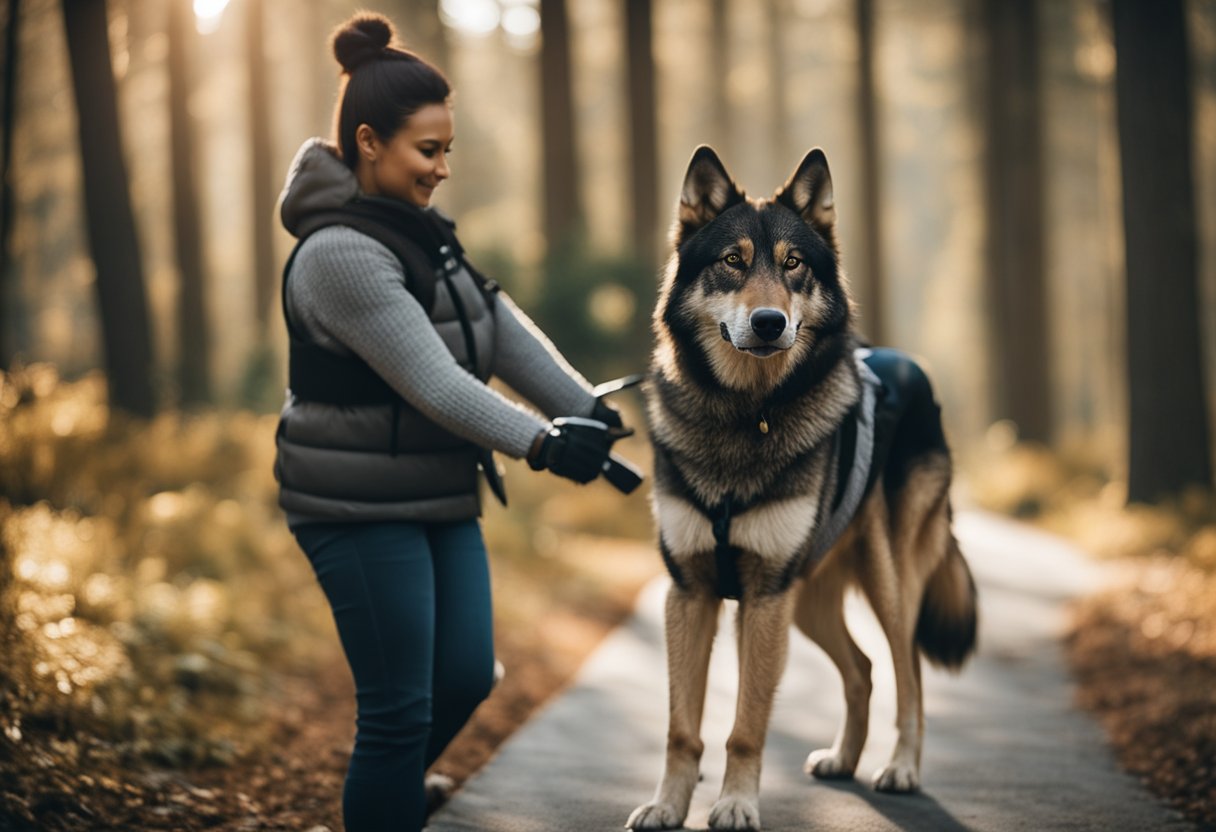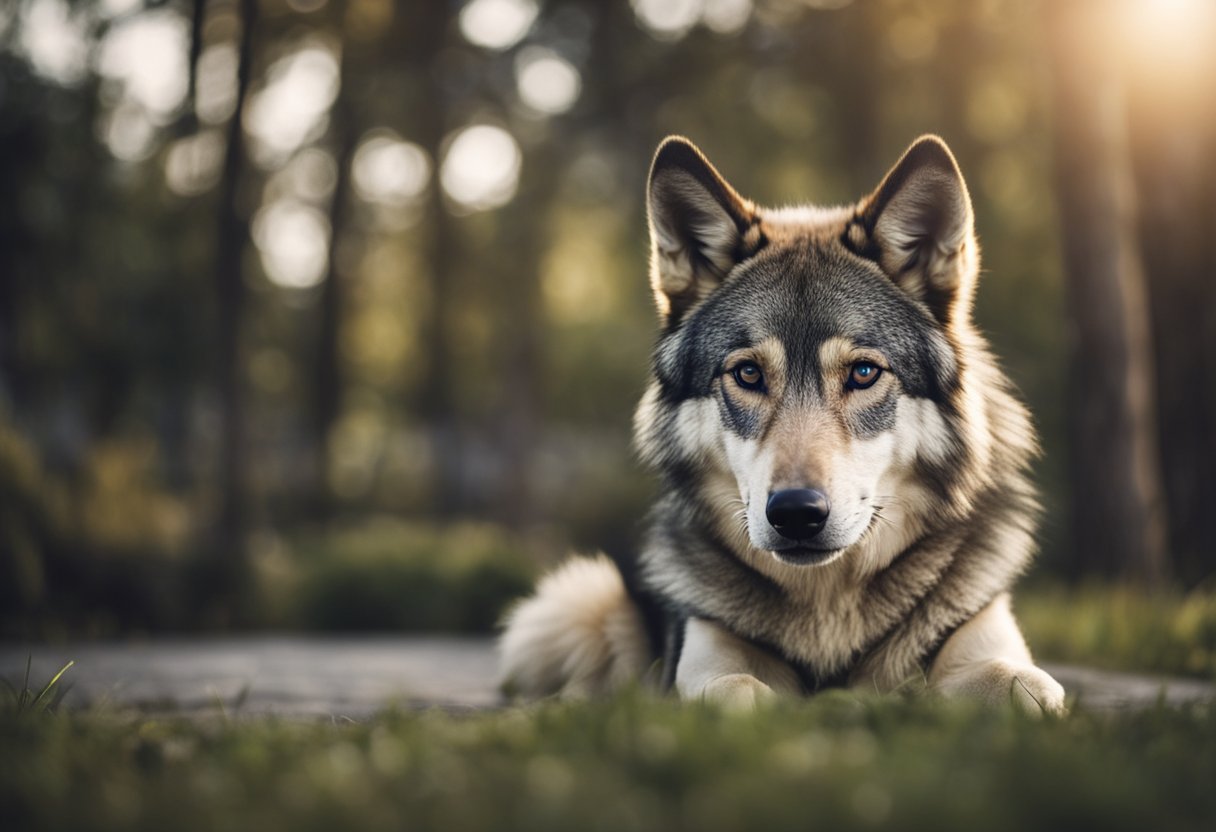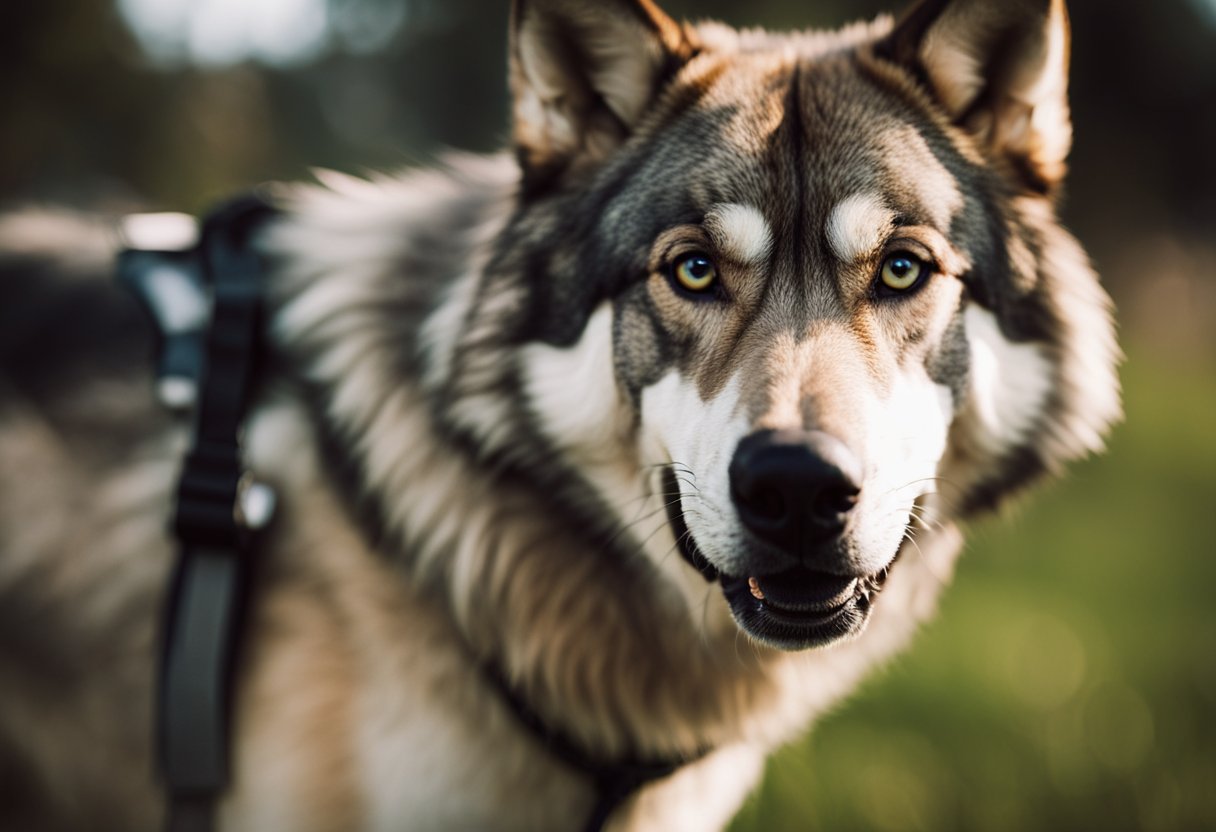After conducting research on the topic, I can confidently say that a wolf dog can be a service dog. However, there are important factors to consider before determining if a wolf dog is the right fit for an individual’s specific needs.

First and foremost, it’s important to understand the differences between a wolf dog and a domesticated dog. A wolf dog is a hybrid of a wolf and a domesticated dog, which means they may exhibit more wild tendencies and behaviors than a typical domesticated dog. This can make training and socialization more challenging, and may require a more experienced handler. Additionally, some states and municipalities have specific laws and regulations regarding wolf dogs, which may impact their ability to serve as a service dog.
When considering a wolf dog as a service dog, it’s important to assess their temperament, training, and socialization. It’s also important to consider the specific needs of the individual who requires a service dog, as a wolf dog may not be the best fit for everyone. Ultimately, the decision to use a wolf dog as a service dog should be made on a case-by-case basis, with careful consideration given to the individual needs of both the dog and the handler.
What is a Wolf Dog?
https://www.youtube.com/watch?v=Afiu327gJIY&embed=true
As the name suggests, a wolf dog is a hybrid between a wolf and a domesticated dog. Wolf dogs can vary greatly in their appearance, depending on the breed of dog that is used in the crossbreeding process. Some wolf dogs may look more like wolves, while others may look more like the domesticated dog breed that was used in the crossbreeding process.
It is important to note that wolf dogs are not recognized as a separate breed by any major kennel club. In fact, many states in the United States have laws that regulate the ownership of wolf dogs, due to concerns about their behavior and potential danger to humans.
Wolves are wild animals that have not been domesticated, and as a result, they have different behavioral characteristics than domesticated dogs. Wolf dogs may exhibit some of these wild behaviors, which can make them difficult to train and handle.
It is also important to note that not all wolf dogs are the same. The degree of wolf content in a wolf dog can vary greatly, and this can have a significant impact on their behavior. In general, the higher the wolf content in a wolf dog, the more wild and difficult to train they may be.
Some breeds of domesticated dogs, such as the German Shepherd, have been bred to have similar physical and behavioral characteristics to wolves. However, even these breeds are not true wolf dogs, as they have not been crossbred with actual wolves.
In summary, a wolf dog is a hybrid between a wolf and a domesticated dog. They can vary greatly in appearance and behavior, and are not recognized as a separate breed by any major kennel club. Due to their wild characteristics, they can be difficult to train and handle, and may not be suitable as service dogs.
Understanding Service Dogs
https://www.youtube.com/watch?v=qBgbQau5ROo&embed=true
As a service dog handler, I have come to understand the importance of service dogs in the lives of people with disabilities. Service dogs are specially trained animals that assist people with disabilities in performing tasks that they cannot do on their own. These tasks can be anything from opening doors to alerting the handler to an oncoming seizure.
Service dogs are different from other types of animals that assist people with disabilities, such as emotional support animals and therapy animals. Service dogs are trained to perform specific tasks to help their handler with their disability. They are not pets, but rather working animals that provide a valuable service to their handler.
To be considered a service dog, the animal must be trained to perform a specific task or work that directly relates to the handler’s disability. This work or task must be something that the handler cannot do on their own due to their disability.
Service dogs go through extensive training to learn obedience, guidance, and task work. They are trained to be well-behaved in public and to ignore distractions. Service dogs must be able to provide assistance to their handler at all times, whether at home or in public.
Service dogs are not just pets that are trained to perform tasks. They are highly trained animals that provide a valuable service to their handler. As a service dog handler, I have come to appreciate the hard work and dedication that goes into training a service dog.
Legal Aspects of Service Dogs

As a service dog owner, it is important to be aware of the legal aspects of having a service dog. The Americans with Disabilities Act (ADA) is the federal law that protects the rights of individuals with disabilities, including those who rely on service dogs. Under the ADA, service dogs are defined as dogs that are individually trained to do work or perform tasks for people with disabilities.
Certification or licensing is not required for service dogs, and there is no official certification process for service dogs. However, some organizations offer voluntary certification programs, which can provide additional training and socialization for service dogs. These programs can also help service dog owners navigate legal issues related to having a service dog.
Two questions that businesses are allowed to ask about a service dog are: (1) Is the dog a service animal required because of a disability? and (2) What work or task has the dog been trained to perform? Businesses are not allowed to ask for documentation or proof of certification for the service dog.
Service dogs have certain protections under the law. For example, service dogs are allowed to accompany their owners in housing, even if the housing has a “no pets” policy. Additionally, service dogs are allowed in places of employment and in public accommodations, such as restaurants and stores.
It is important to note that while service dogs are protected under the ADA, emotional support animals (ESAs) are not considered service dogs and are not protected under the ADA in the same way. ESAs may be allowed in housing under the Fair Housing Act, but they are not allowed in public accommodations.
In conclusion, understanding the legal aspects of having a service dog is crucial for service dog owners. While certification and licensing are not required, being knowledgeable about the ADA and the protections it provides can help service dog owners navigate legal issues related to their service dogs.
Training a Wolf Dog as a Service Dog
https://www.youtube.com/watch?v=jnTMmRnFMhw&embed=true
As a service dog, a wolf-dog hybrid can be trained to perform specific tasks for their handler. However, it is important to note that training a wolf dog as a service dog can be a challenging and time-consuming process.
First and foremost, obedience training is crucial for any service dog, including a wolf-dog hybrid. This involves teaching the dog basic commands such as sit, stay, come, and heel. It is essential to establish a strong foundation of obedience before moving on to more advanced training.
In addition to obedience training, a wolf-dog hybrid must be trained to perform specific tasks that are tailored to their handler’s needs. This can include tasks such as alerting their handler to sounds or smells, providing mobility assistance, or retrieving items.
One of the challenges of training a wolf-dog hybrid as a service dog is their tendency to be easily distracted. It is important to train them to focus on their handler and ignore distractions. This requires patience and consistency in training.
Another important aspect of training a wolf-dog hybrid as a service dog is socialization. Socializing the dog to different environments, people, and other animals is crucial for their success as a service dog. It is important to expose them to a variety of situations to ensure they can handle any situation they may encounter.
Overall, training a wolf-dog hybrid as a service dog requires patience, consistency, and a specific set of skills. It is crucial to work with a professional dog trainer who has experience training wolf-dog hybrids and understands their unique needs. With proper training and socialization, a wolf-dog hybrid can make an excellent service dog for the right handler.
Challenges in Training Wolf Dogs

As a service dog, a wolf dog presents unique challenges in training. Wolf dogs are a hybrid of wolves and dogs, which means that they have a mix of wolf and dog traits. The temperament and nature of wolf dogs can vary depending on the percentage of wolf and dog in their genetic makeup.
Wolf dogs have a natural instinct that can make them behave aggressively towards other animals or humans. It is important to control this behavior through socialization and training. However, it is essential to note that wolf dogs may never fully lose their instinctual behavior, which can make training challenging.
One of the biggest challenges in training wolf dogs is socialization. Wolf dogs require extensive socialization to become comfortable around other animals and humans. This socialization process should start as early as possible and continue throughout the dog’s life. It is crucial to expose wolf dogs to a variety of situations and environments to help them learn how to react appropriately.
Another challenge in training wolf dogs is their behavior. Wolf dogs can be more independent and less responsive to commands than other breeds of dogs. They may require more time and patience to train, and it is important to use positive reinforcement techniques to encourage good behavior.
In conclusion, while wolf dogs can make excellent service dogs, they present unique challenges in training. Wolf dogs require extensive socialization, and their instinctual behavior can make training difficult. However, with proper training and socialization, wolf dogs can become well-behaved and reliable service dogs.
Health and Care of Wolf Dogs
As a service dog owner, it is essential to provide your wolf dog with proper care and attention to ensure their health and well-being. Wolf dogs require a high level of care, and it is essential to understand their unique needs.
Health
Wolf dogs are prone to certain health issues, such as hip dysplasia, bloat, and dental problems. It is crucial to take your wolf dog for regular check-ups to the veterinarian to ensure they are healthy and to catch any potential health issues early.
Additionally, it is essential to keep your wolf dog up to date on vaccinations to prevent diseases such as rabies, distemper, and parvovirus. Regular grooming is also necessary to keep your wolf dog’s coat healthy and prevent skin infections.
Diet
Wolf dogs require a specific diet that meets their nutritional needs. It is important to provide them with a high-quality, protein-rich diet that includes raw meat, fruits, and vegetables. Avoid feeding your wolf dog processed foods or foods high in carbohydrates, as this can lead to obesity and other health issues.
Vaccinations
Vaccinations are crucial for the health of your wolf dog. It is essential to keep your wolf dog up to date on all necessary vaccinations to prevent the spread of diseases and ensure their health.
Care
Wolf dogs require a high level of care and attention. It is essential to provide them with regular exercise and mental stimulation to keep them healthy and happy. Additionally, it is important to socialize your wolf dog from a young age to ensure they are comfortable around people and other animals.
In conclusion, providing proper care and attention to your wolf dog is essential to ensure their health and well-being. Regular check-ups, vaccinations, a nutritious diet, and regular exercise are all crucial elements of caring for your wolf dog.
Benefits of Wolf Dog Service Dogs
As a service dog, a wolf dog can provide numerous benefits to its owner. Here are some of the benefits that a wolf dog service dog can offer:
Assistance Tasks
Wolf dogs can be trained to perform a variety of assistance tasks, such as opening doors, turning on lights, retrieving objects, and more. These tasks can be especially helpful for individuals with mobility impairments.
Companionship
A wolf dog can provide a strong sense of companionship to its owner. This can be particularly important for individuals who may feel isolated or lonely.
Sense of Security
Wolf dogs can provide a sense of security to their owners. They can be trained to alert their owners to potential dangers and to provide a physical barrier between their owners and any perceived threats.
Mobility Assistance
Wolf dogs can be trained to assist individuals with mobility impairments by providing balance support, helping with transfers, and more.
Mental Health Disorders
Wolf dogs can be trained to provide assistance to individuals with mental health disorders, such as PTSD, depression, and anxiety. They can provide emotional support and help their owners to feel more grounded and calm.
Epilepsy
Wolf dogs can be trained to detect when their owners are about to have a seizure and to provide assistance during and after the seizure.
Overall, a wolf dog can make an excellent service dog for individuals with a variety of needs. However, it is important to note that not all wolf dogs are suitable for service work, and each individual dog must be evaluated on a case-by-case basis.
Potential Risks and Considerations
As with any service animal, there are potential risks and considerations associated with using a wolf-dog hybrid as a service dog. It is important to carefully evaluate these risks before deciding if a wolf-dog hybrid is the right choice for a particular individual’s needs.
One of the primary concerns with using a wolf-dog hybrid as a service dog is the potential danger that these animals can pose. While they are often bred for their loyalty and protective instincts, they can also be unpredictable and may not be suitable for all individuals. It is important to carefully evaluate the temperament and behavior of any potential service animal before making a decision.
In addition to concerns about the animal’s behavior, there may also be legal considerations to take into account. Some local laws may restrict the ownership or use of wolf-dog hybrids, and it is important to be aware of these regulations before making a decision.
Another important consideration is the amount of space that a wolf-dog hybrid requires. These animals are often larger than traditional service dogs and may require more room to move around and exercise. It is important to ensure that the animal has adequate space to live and work comfortably.
Overall, while a wolf-dog hybrid may be a suitable choice for some individuals, it is important to carefully evaluate the potential risks and considerations before making a decision. By working closely with a qualified service animal provider and carefully evaluating the animal’s behavior and temperament, it may be possible to find a safe and effective service animal that meets the individual’s needs.
FAQs About Wolf Dog Service Dogs
As a service dog owner myself, I understand how important it is to have all the information you need about your service dog. Here are some frequently asked questions about wolf dog service dogs that may help you:
Can a Wolf Dog be a Service Dog?
Yes, a wolf dog can be a service dog as long as it is trained to perform specific tasks for its handler with a disability. However, it is important to note that wolf dogs are not recognized as a breed by the American Kennel Club (AKC) and are considered a hybrid of wolves and dogs. Therefore, it is important to check your local laws and regulations regarding wolf dogs as service animals.
What Tasks Can a Wolf Dog be Trained to Perform?
A wolf dog can be trained to perform a wide range of tasks depending on the handler’s disability. These tasks can include but are not limited to guiding the visually impaired, alerting the deaf, providing mobility assistance for those in wheelchairs, and even detecting and responding to seizures.
Does a Wolf Dog Need to Wear a Vest or Have Any Special Identification?
While it is not required by law for a service dog to wear a vest or have any special identification, it is highly recommended. A vest can help identify the service dog as a working animal and can provide additional protection for the dog and handler. Additionally, some establishments may require proof of the dog’s status as a service animal, and a vest or identification tag can help demonstrate this.
Is it Safe to Own a Wolf Dog as a Service Animal?
While wolf dogs can make great service animals, it is important to note that they are still a hybrid of wolves and dogs and may have some wild instincts. Therefore, it is important to work with a professional trainer to ensure proper obedience and control. Additionally, it is important to follow all local laws and regulations regarding owning a wolf dog as a service animal.
How Much Does it Cost to Train a Wolf Dog as a Service Animal?
The cost of training a service dog, including a wolf dog, can vary depending on the specific tasks the dog needs to perform and the length of training required. However, it is important to note that some organizations offer financial assistance for individuals with disabilities who require a service animal.
Can a Wolf Dog also be a Therapy Dog?
Yes, a wolf dog can also be trained as a therapy dog to provide companionship and guidance to individuals in hospitals, nursing homes, and other settings. However, it is important to note that therapy dogs are not recognized as service animals and do not have the same legal protections.
In summary, a wolf dog can make a great service animal with proper training and socialization. However, it is important to check local laws and regulations and work with a professional trainer to ensure the safety and effectiveness of the dog as a service animal.






